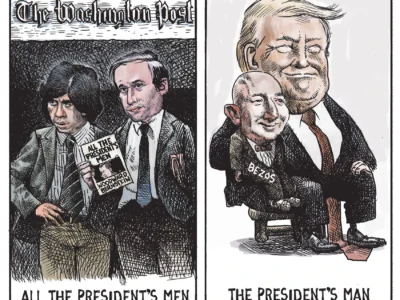Going Private
A new book argues that businesses and individuals can take the lead in reducing emissions.
Beyond Politics: The Private Governance Response to Climate Change, by Michael Vandenbergh and Jonathan Gilligan, is an ambitious effort to demonstrate the promise of non-governmental efforts to reduce emissions. They argue it is a mistake to pin all our hopes to one climate strategy like a national cap-and-trade system. For this reason, they argue that we should look beyond politics to the private sector – both companies and individuals — for help.
Vandenbergh and Gilligan make a strong case for the potential for private climate action to cut emissions. They open with the story of Walmart’s dramatic 20 million ton emissions cut. Of course, Vandenbergh and Gilligan are aware of the possibility of greenwashing – false claims of environmental virtue. But they point out that noncompliance with government regulations is also more than a hypothetical possibility, illustrating that any approach to reducing carbon will have less than perfect success in achieving its promised results.
In both the book and the series of article that preceded it, the authors deserve considerable credit for highlighting this important, and often-overlooked, approach to addressing climate change. They assemble a mass of evidence that reveals the prevalence, importance, and potential of climate action by corporations and individuals. This is a phenomenon that is beginning to receive public attention. For instance, the NY Times reported in a 2017 article about how corporations were picking up the slack due to the Trump Administration, and “almost two dozen companies, including Google, Walmart and Bank of America, have pledged to power their operations with 100 percent renewable energy, with varying deadlines, compared with just a handful in 2015.”
In highlighting this approach, Vandenbergh and Gilligan hope to appeal who do not prioritize climate change as a political issue, as well as those who reject climate science because of an aversion to expanding the role of government. Indeed, they say, they contemplated publishing two versions of the book, one for liberals, who might be put off by the idea of relying on the public sector, and one for conservatives, who may deny climate change out of aversion to greater regulation. Although they view a strong international agreement as the ideal policy response, they argue that we should not be distracted from more practical, immediate action by this future prospect.
Climate change is one of the great global challenges confronting us. As Vandenbergh and Gilligan realize full well, private actions alone will not be enough. Governments and international institutions will play a vital role. But in confronting a problem of this magnitude, we cannot afford to overlook any possible channel for action.
Vandenbergh and Gilligan show that private action can make a limited but genuine contribution to cutting carbon. Their evidence is spottier on this point, but there is reason to hope that private action can also help shift the terms of an increasingly bitter and divisive political debate. One worry, of course, is that efforts to promote private action might detract from the campaign for government regulation. But there is reason to hope that private steps to decarbonize while actually create moment for government action.
If you’re interested, you can find more detail about the book, and some thoughts about how private climate governance could actually be strengthened, in this book review. I also discuss some related contract law issues here. Rather than either celebrating or deprecating the efforts of the private sector, we need to find ways to push businesses and individuals to do more.
Reader Comments
One Reply to “Going Private”
Comments are closed.







While private sector GHG commitments are laudable, it is very difficult to track companies’ performance, particularly non-publicly-traded ones. Accountability can be elusive. Let’s hope firms do a better job than cities, whose “We Are Still In” pledges have often been hollow and unmeasured.
https://www.greentechmedia.com/articles/read/hard-truths-about-city-failures-with-clean-energy